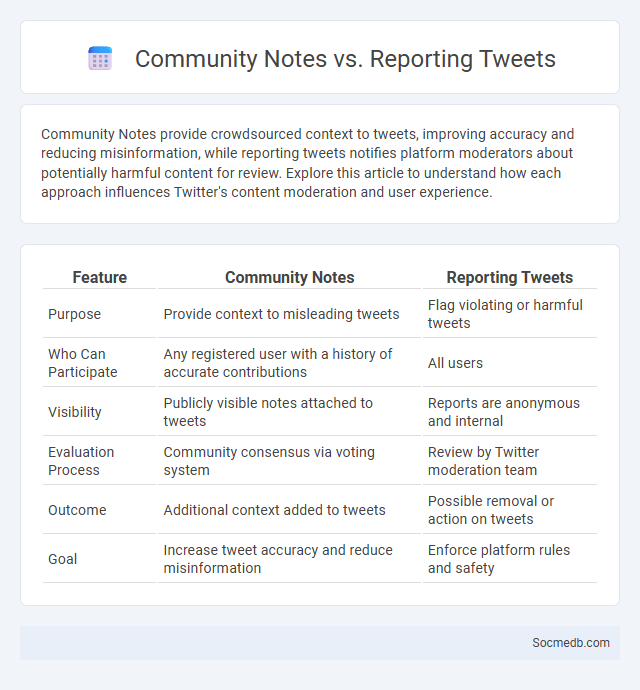
Photo illustration: Community Notes vs Reporting Tweets
Community Notes provide crowdsourced context to tweets, improving accuracy and reducing misinformation, while reporting tweets notifies platform moderators about potentially harmful content for review. Explore this article to understand how each approach influences Twitter's content moderation and user experience.
Table of Comparison
| Feature | Community Notes | Reporting Tweets |
|---|---|---|
| Purpose | Provide context to misleading tweets | Flag violating or harmful tweets |
| Who Can Participate | Any registered user with a history of accurate contributions | All users |
| Visibility | Publicly visible notes attached to tweets | Reports are anonymous and internal |
| Evaluation Process | Community consensus via voting system | Review by Twitter moderation team |
| Outcome | Additional context added to tweets | Possible removal or action on tweets |
| Goal | Increase tweet accuracy and reduce misinformation | Enforce platform rules and safety |
Introduction: Understanding Community Notes and Reporting Tweets
Community Notes empower Twitter users to collaboratively add context to tweets by providing fact-checking and clarification, enhancing information accuracy across the platform. Reporting tweets allows users to flag content that violates Twitter's policies, thereby supporting the moderation system and promoting a safer online environment. Together, these features contribute to maintaining transparency and credibility within the social media community.
What Are Community Notes?
Community Notes are a collaborative feature on social media platforms designed to improve content accuracy by enabling users to add context or corrections to posts. Your contributions to Community Notes help combat misinformation by providing reliable information verified through a community-driven fact-checking process. This system enhances trust and transparency, making social media interactions more informative and credible.
How Reporting Tweets Works
Reporting tweets involves identifying content that violates platform policies and submitting a report to the social media site for review. You can flag tweets containing hate speech, harassment, misinformation, or spam through specific reporting options embedded within the tweet interface. Once reported, the platform's moderation team evaluates the content against community guidelines, potentially leading to tweet removal or account suspension.
Key Differences Between Community Notes and Reporting Tweets
Community Notes provide collaborative, context-rich annotations to tweets, aiming to reduce misinformation by offering additional perspectives from diverse contributors. Reporting Tweets allows users to flag content that violates platform policies, leading to moderation actions such as removal or warning labels. While Community Notes enhance transparency and collective fact-checking, Reporting Tweets enforce rules through direct intervention by the platform's moderation team.
User Participation in Community Notes
User participation in Community Notes enhances content accuracy by allowing individuals to contribute real-time fact-checking and context on social media platforms. Your active involvement helps reduce misinformation, fostering a more trustworthy and transparent online environment. Engaging with Community Notes empowers users to collaborate in maintaining platform integrity while promoting informed discussions.
Moderation and Verification Processes
Effective social media platforms implement robust moderation and verification processes to ensure authentic user interactions and reduce misinformation. Automated algorithms combined with human moderators identify and remove harmful content such as hate speech, spam, and fake profiles. Verification mechanisms, including two-factor authentication and identity confirmation badges, establish credibility and build trust among users.
Impact on Misinformation and Content Accuracy
Social media platforms play a significant role in the spread of misinformation, often amplifying false or misleading content through rapid sharing and algorithm-driven recommendations. This environment challenges content accuracy, making it essential for you to critically evaluate sources and verify information before accepting it as true. Effective fact-checking tools and platform policies continue to evolve in an effort to mitigate the impact of misinformation on public perception and decision-making.
Pros and Cons of Community Notes
Community Notes on social media enhance content accuracy by allowing trusted users to add context and correct misinformation, improving overall platform reliability. However, the system may face challenges such as potential biases from contributors and the risk of delayed corrections in rapidly spreading false information. Balancing transparency with efficient moderation remains crucial for maximizing the benefits of Community Notes.
Pros and Cons of Reporting Tweets
Reporting tweets helps maintain platform safety by flagging harmful content such as hate speech, misinformation, and harassment, promoting a healthier online environment. However, it can also lead to misuse through false reporting or censorship, potentially stifling free expression and causing delays in content moderation. Balancing effective reporting systems with transparent review processes remains crucial for social media platforms.
Which Approach Is More Effective for Twitter Communities?
Engaging Twitter communities thrives on authentic interaction and consistent content relevance tailored to your niche audience. Leveraging targeted hashtags and real-time response strategies maximizes visibility and fosters deeper connections within these digital networks. Your success depends on blending strategic content curation with active community participation to enhance engagement rates and grow your social influence.
 socmedb.com
socmedb.com